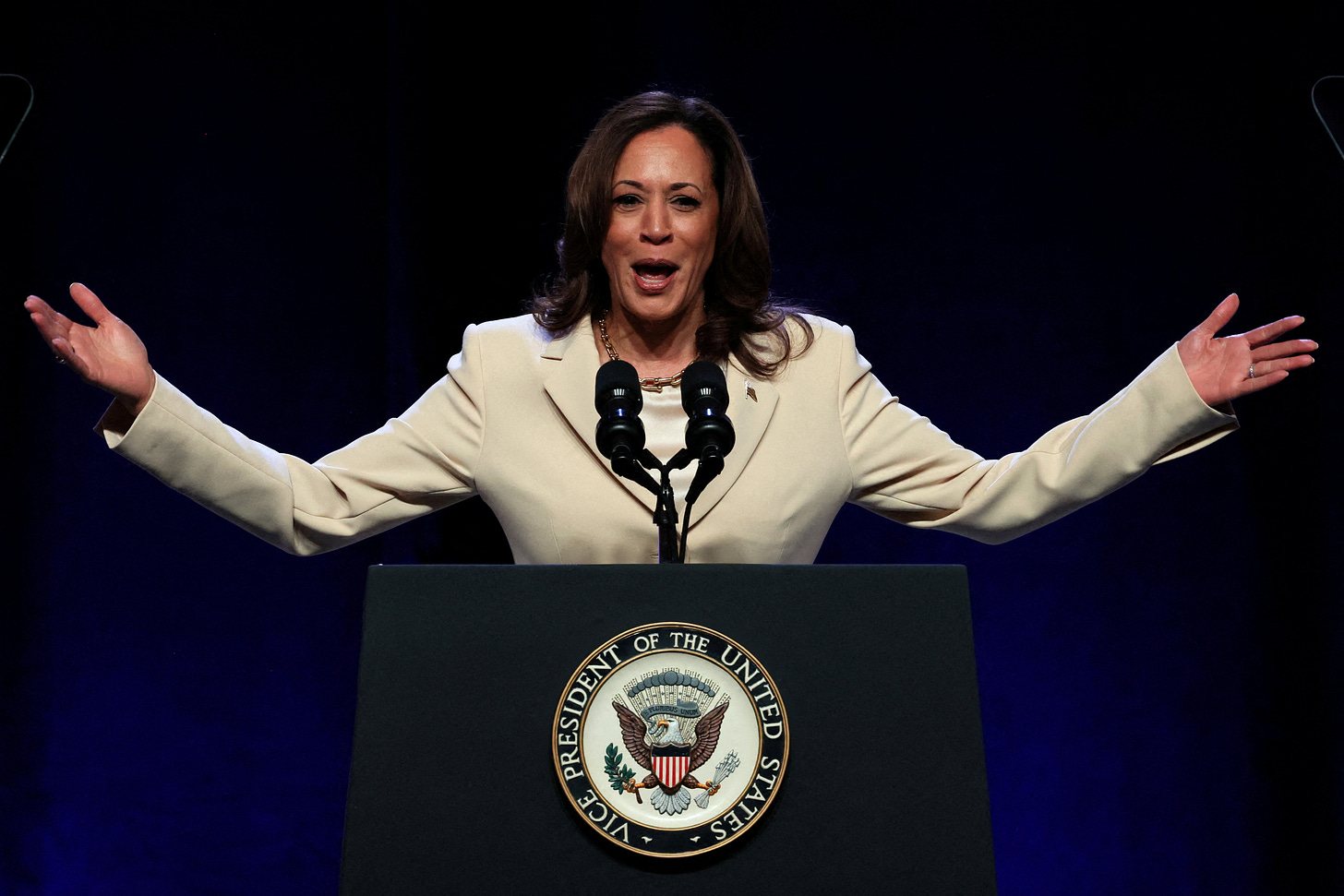DNC: Season of Good Vibes
Can Kamala Harris ride media momentum to win in November? History says yes.
If there’s one thing that’s been proven over political history, the press prefers novelty over staleness.
The meteoric rise of Kamala Harris as a presidential candidate — culminating with her official nomination in Chicago Thursday night — is proof of how good the Democrats are at selling “good vibes” and the media’s role in pushing that narrative.
As someone who has voted both Republican and Democrat in my life, I find Harris an incredibly unappealing candidate. She slept her way to power in California, has a prosecutorial record big on social justice reforms, soft on stopping criminals, flip-flopped on her identity, yet in this part of the 21st century, that’s shrewd politics. Harris became the identitarian choice for vice president, showed little interest in policy or even any basic grasp of governance, becoming an online punching bag for her sophistry speech making, yet has managed to fails forward enough up the staircase of power to be one election away from the Oval Office. It’s difficult for me to wrap my head around a scenario where an empty vessel like Harris can ascend to the presidency. But American voters have done this with Democratic candidates before, with the press as willing accomplice.
Most recently, Barack Obama.
The press sold Obama as a transformative (that word, “transformative,” first got injected into the cultural bloodstream during the Obama era) candidate. That “transformation” had to be packaged as “hope” and “change” due to the fact Obama had no background whatsoever in a leadership role, with little record to speak of. He barely moved furniture into his senatorial office before he announced his presidential run in 2006. But Obama was a tremendous orator, did a ton of interviews, selling politics as not down-in-the-mud dirt battle but as a more feminized spiritual move to the light. It worked. I was there in Grant Park the night of his acceptance speech. The environment was incredible, reminiscent of seeing U2 in the 90’s or Bruce Springsteen at Sox Park after 9/11. But they are artists who perform three-minute songs about a “Beautiful Day” or “Waiting For A Sunny Day,” knowing music is best consumed as temporary respite from reality. Obama won the presidency pitching his own beautiful days, only his had to be actionable, not metaphors from a pop song. Depending on your viewpoint of his presidency, I’d say a victory for good vibes.
In 1992, I was a student at Michigan State University. One of the presidential debates that year was held in East Lansing, MI, home of MSU. Working for the college newspaper, I recall the enthusiasm amongst my colleagues for this fresh faced 40-something out of Arkansas, Bill Clinton. He was smart, charming, liked to stay up late and have a good time, sort of like the fun uncle in the family. And he wore Blues Brothers sunglasses and played the saxophone on Arsenio Hall! Contrast that with his opponent that year, George H.W. Bush, who reminded my friends and I of that ham-fingered dean of students who carried around a handbook of rules and complained about “kids and their tomfoolery.” MTV remained a huge factor in pop culture back then and the cable channel orchestrated a “Rock The Vote” campaign and got Gen X’ers to the polls. Who cared about the substance of the issues? Bush was old, Clinton was new. Another victory for good vibes (in retrospect, I’d say Clinton’s presidency was more impactful on the country than Obama’s).
We could go back to deeper into history with John F. Kennedy, another Democratic insurgent from the 1960’s.
JFK was basically an introverted intellectual who conditioned himself from a very young age to be an objective thinker and collaborative decision-maker. He likely would have entered journalism or academia until an inciting incident — the death of older brother Joe in WW2 — thrust him into politics. Initially reluctant to run for the White House, he managed to outflank older, more experienced politicians such as former Illinois Governor Adlai Stevenson to gain the nomination. The first-ever televised presidential speech provided the perfect contrast between Kennedy — polished, tan, youthful — to Republican nominee Richard Nixon, who came across to a national audience as nervous, anxious and just plan out of touch. Arguably first good vibes election of the mass media era.
Obviously, these examples are just historical comparisons, not meant to be predictive of what will happen this November. All of the winning Dems mentioned brought something to the table, able to leverage media coverage to their advantage.
I don’t see anything Harris brings to the table other than she’s not Trump. Yet like Harris, he’s an unappealing candidate.
And he’s in trouble right now, figuring out how to counter Harris’s “we’re not going back” messaging. Trump is old, his fame a distraction rather than asset, and struggling to sell a future vision of American that’s not stuck in the past. He has time to rebound and the upcoming debates present an opportunity to pitch his 2024 MAGA vision while exposing Harris as nothing more than a vacuous hologram.
People are fine with change, but they eventually want specifics.
Or do they? History has shown they don’t and that Jeff Spicoli-like good vibes may just be enough.
Have a suggestion for The Kerr Report? Send email to jonjkerr@gmail.com.





"Vacuous hologram".
Quite apt. Nice.